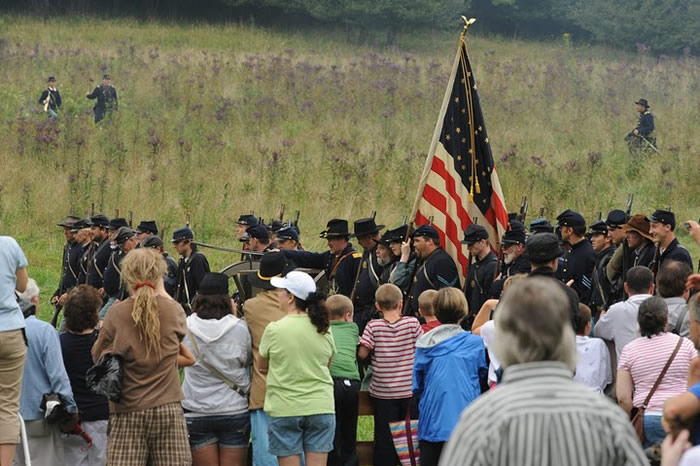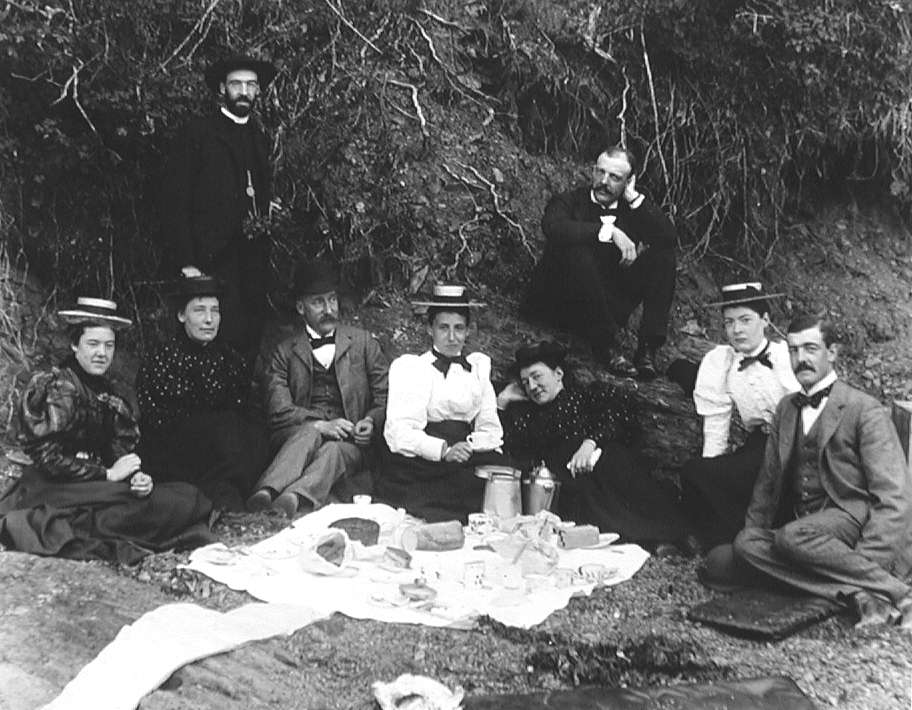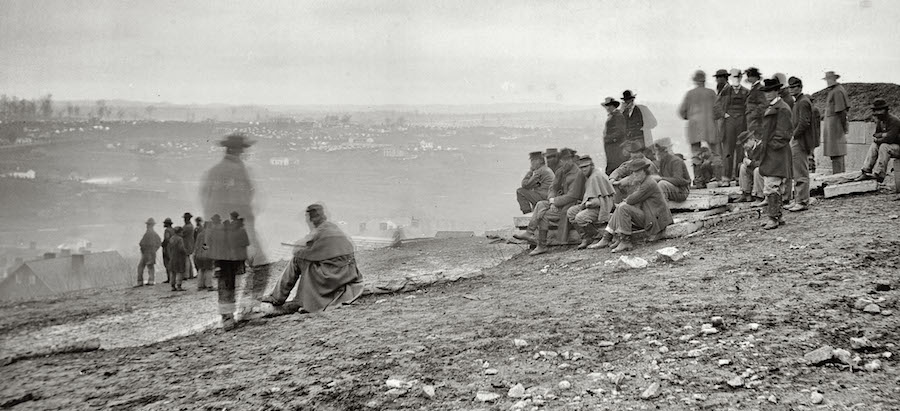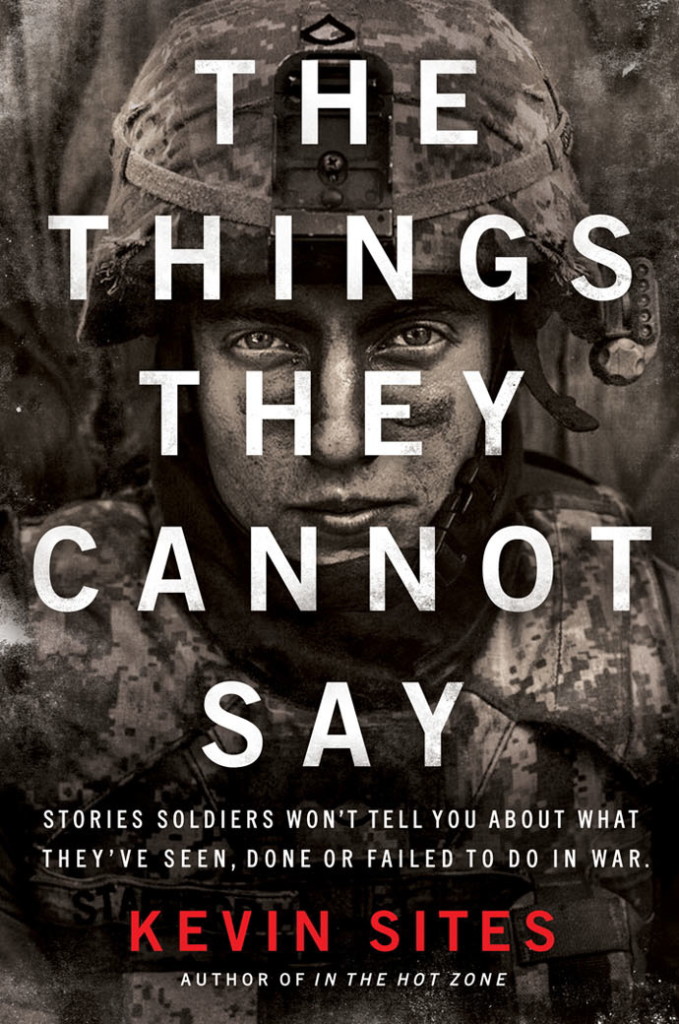There is a need to hear, tell, and share stories of conflict, violence and trauma but there is a weird history of becoming spectators in stories of conflict, even as we retell our own story or listen to the sharing of others. The Things They Cannot Say by Kevin Sites is a collections of stories that bring us as readers a step beyond spectators.
I was amazed to hear that during the Civil War there were what we would call “Watch Parties.” I live in Richmond, VA and there are several hills where the wealthy would dress up and come out to see the action. This is a picture of a champagne picnic watching the Battle of Bull Run and below is at the Battle of Tennessee. This is quite different from our dinnertime nightly news update on the days violence but our role as spectator isn’t that new or unlike the watch parties of history.
In The Things They Cannot Say Kevin Sites share stories of soldiers experiences of war and the trauma it causes. These quotes from the book highlight the struggle and value of storytelling.
“Storytelling also knits a community together. It records or recreates the collective history and transforms actors and listeners alike into community witnesses,” according to Tick in War and the Soul . He continues: “Veterans’ stories need to be told in a way that transfers the oral weight of the event from the individual to the community.” (from Karl Marlantes)
“Failure to communalize grief can imprison a person in endless swinging between rage and emotional deadness as a permanent way of being in the world.” (from Dr. Jonathan Shay)
I find it difficult to be on the listening end of stories of conflict, ineptly attempting to reflect the meaningfulness and intent of the person who is sharing their experience. Sites’ book is a good opportunity to hear the stories of those who have served their country (not just from the USA) is one way I can feel one less step away from the struggle of others.





We live in a world unfortunately of much conflict. Since the beginning of time, history has been a story of opposing philosophies fighting each other. Stories of conflicts encompass many different types of conflict, mental, physical, and biological. However they all have one thing in common, they must be shared. When we bottle these important emotions up inside of us, the resulting product is tension, anxiety, depression, and mistrust. To change this there are many ways, one way of which I have learned is Aikido. It is a practice that is not only ancient and supplemental, it is also meant for clarity of the mind, body, and spirit. To channel our inner focus into something powerful and peaceful, yet also protective and deadly. This combo is what is needed to help people who have seen unbelievable images of horror and death, watching family members and friends pass away due to situations out of their own locus of control. To bring these individuals back to society, so they may function without adverse affects of their past experiences ruining any future relationships or social situations the strict balance of Aikido’s practices in therapy as well as defense is a perfect antidote to the venom they have been plagued with. They will be able to bond with others who have been through similar situations and change their current predispositions to clear their mind, heal their spirit, and nourish their minds. As a peoples, we must realize that we have more similarities than differences and the real achievement is in unity, because chaos is easy, peace requires true noble effort and beautiful character, something not in today’s world.
Quite a thought-provoking post. It is important, but often difficult, for people to be mindful of the role they are playing as “listeners”. Too often the news devolves into what seems like a three-ringed circus of entertainment at others’ expense- from celebrities to refugees of war. It is vital that we be aware of what is happening and what has happened in the world around us. Sharing stories is a crucial way of spreading information and wisdom, and important for tying people together to achieve healing and betterment. But in order to achieve these positive things, the stories must be told and listened to with respect.
I, as I’m sure many do, relate very much to your final paragraph- the struggle of wanting to express respect and empathy to someone who is sharing with you their story of struggle and pain. It can be nigh impossible to know what words to say in response; the words that come to mind often seem so hollow compared to a story so important and meaningful. I have found that often times, what people want most when they share their pain is for someone else simply to listen respectfully. Sometimes the best thing to begin the road of recovery is for a person simply to have validation and recognition for what they have been through. No fancy words, just understanding from another human being. This shared understanding is what ties people and communities together. This shared understanding is what makes us all wiser and stronger.
P.S., the Civil War picnics thing is wild. I’ve heard about this, but to see actual photos is astonishing. That was a bloody time that tore our country apart. While it may be appalling to think about how people dressed up to watch that suffering for entertainment, it does serve as a humbling reminder that many of our mainstream news programs today are no different.
Reading this article makes me think that in a world where conflict and violence seem to be everywhere and in everyone, Aikido presents an option to create balance and harmony in people’s lives and to tailor problems and conflicts. Doing Aikido helps me understand how harmony (ai) is possible when you allow your mind and body to integrate in order to balance your personal life and what you experience day by day.
A first step in achieving balance is to recognize your emotions and use them in a way that does not represent harm to your partner. Although it is not easy to do during a conflict, paying attention to flow and to energy also helps us recognize how energy can be used to either apply total resistance or full power attack in a technique. Although people might think aikido is a combative martial art to fight enemies, as I did, it helps to fight your own personal negative individualities that might hinder those abilities to free your mind and become one with the universe. Another way in which aikido represents a positive way to tailoring problems and conflict is using breathing techniques that bring you at peace when using your energy as a life-force (ki).
Breathing freely does not only allow us to center our minds when doing aikido but also to manage stress on a daily basis. I believe that this can very positive particularly for those who have experienced trauma. As aikido is a way (do) to reconcile the world and ourselves, I think we are invited to know more about ourselves and how to offer compassion and support to others. In a world that offers us retaliation as a way to protect ourselves, let us cultivate our minds and bodies in a way that we are people of change and living creatures that make aikido a way to balance harmony and life-force with all.